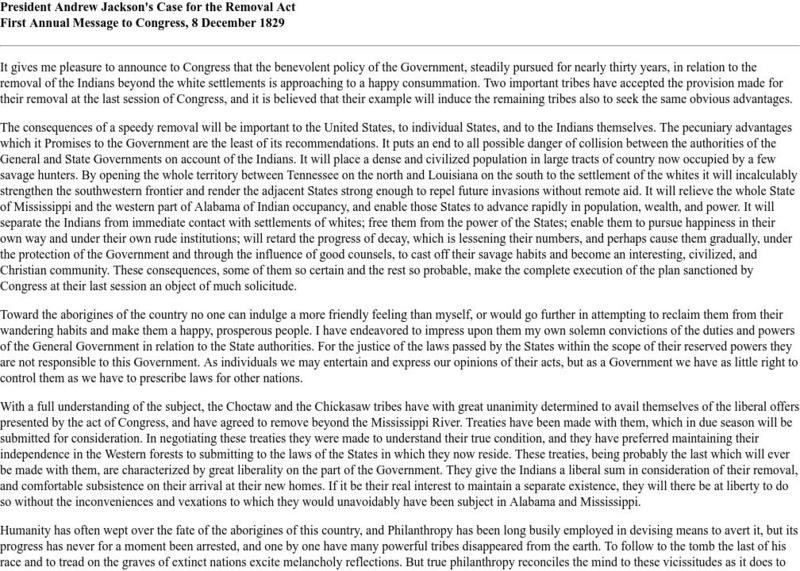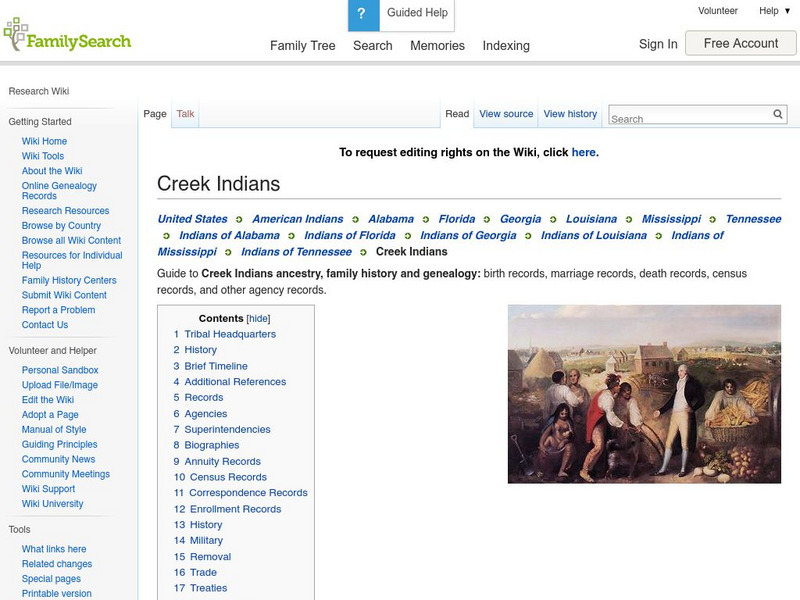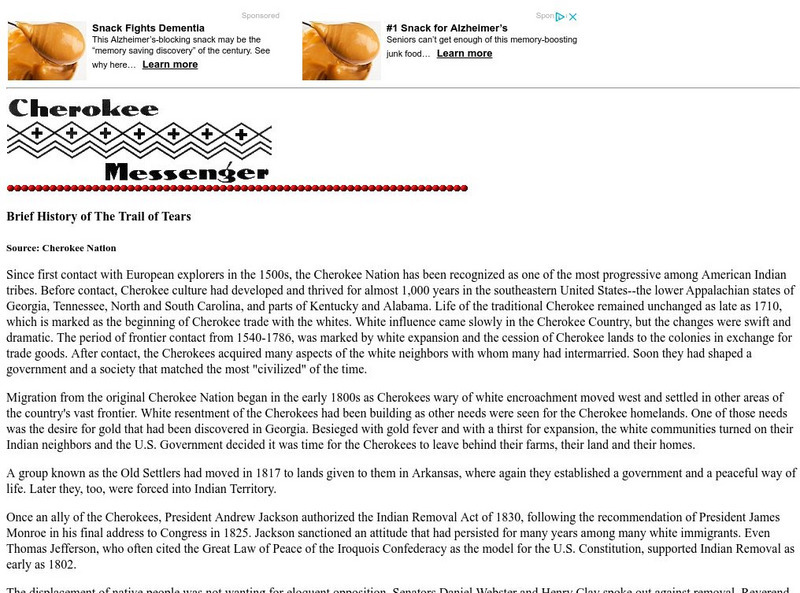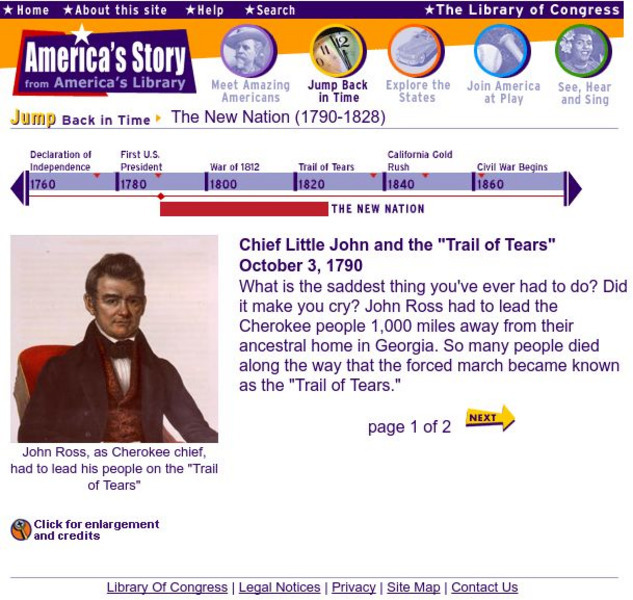Curated OER
Jim Thorpe's Bright Path
Young scholars read about the life of Jim Thorpe and answer focus lessons about the book. In this Jim Thorpe lesson, students celebrate the American Indian culture and learn of the hardships Jim Thorpe overcame. Young scholars find...
Curated OER
Andrew Jackson and the Trail of Tears
Students examine the three historical portraits Andrew Jackson, iam Pitt and Portrait of a Boy for symbolism. They research Andrew Jackson's involvement in the Cherokee Indians' Trail of Tears in North Carolina, and compose a portrait.
Curated OER
Changing Opinions
Students compare their preconceptions of Native American movement with their current perceptions. They identify why they have changed. Students conclude with a final reflection addressing how they define the Native American experience in...
US National Archives
Our Documents: President Andrew Jackson's Message, 'On Indian Removal'
Interactive image of the original document through which President Andrew Jackson called for "Indian Removal," in 1830. Includes transcription as well as background and overview of the text and results of the Indian Removal policy.
US National Archives
Our Documents:president Jackson's Message to Congress 'On Indian Removal' (1830)
On December 6, 1830, President Jackson spoke to Congress about his position on relocating Indians in order to make way for settlers in the west. This paved the way for government policy in dealing with native peoples even after his...
Missouri State University
Delaware Town: Removal Era
Discussion of the removal of American Indians living east of the Mississippi River beginning in the late 1700s. Initially, these removals were voluntary, resulting from treaty negotiations. In 1830, Congress passed the Indian Removal...
Mount Holyoke College
International Relations: Andrew Jackson's Case for the Removal of Indians
Here, read the text to President Jackson's "First Annual Message to Congress, 8 December 1830," in which Jackson argues for the removal of Native Americans.
Other
Family Search: Creek Indians
This website provides a fairly comprehensive look at the Creek Indians including a brief history, a timeline, birth and death records, references, and links to historical records. These records include: census data, and information from...
Other
Eastern Band of Cherokee: History and Culture
A brief history of the Cherokee tribe in the southwest United States, its culture, government, and religion. Find out about the Cherokee who were subject to the Indian Removal Act of 1830, and see how the Cherokee in North Carolina have...
Other
Cincinnati Arts Association: Native American Heritage [Pdf]
This study guide, originally designed to accompany an artist-in-the-schools outreach program, can be used to teach about hidden Native communities that populated the Ohio region after the Indian Removal Act of 1830.
University of Virginia
Miller Center at Uva: u.s. Presidents: Andrew Jackson: Domestic Affairs
A comprehensive overview of the domestic issues facing Andrew Jackson in his presidency, from the "spoils system" to veto of the bank recharter to his Indian removal policy.
Khan Academy
Khan Academy: Ap Us History: 1865 1898: Indian Wars and Battle of Little Bighorn
Discusses the series of events and conflicts in the Indian Wars that culminated in the Battle of the Little Bighorn, or Custer's Last Stand. Includes questions for students at end.
PBS
Pbs: Indian Territory
This site from PBS provides a short description and map of "the Indian Territory set aside by the Indian Removal Act of 1830 and the areas designated for each tribe."
Other
Civics Resources: Worcester v. Georgia
In December 1829, President Andrew Jackson announced his Indian removal proposal in an address to the U.S. Congress. In 1830 Congress passed the Indian Removal Act, which authorized the president to grant the Indians unsettled lands west...
Other
Cherokee Messenger: Brief History of the Trail of Tears
This website gives details about the events that led up to the displacement of the Cherokee Indians and the "Trail of Tears."
PBS
Wnet: Thirteen: Freedom: A History of Us: Liberty for All? Webisode 3
Webisode 3 - Liberty for All? The history of the United States is presented in a series of webisodes, within each are a number of segments.Included are links to lesson plans, teacher guides, resources, activities, and tools.
CommonLit
Common Lit: "Excerpt From Trail of Tears Diary" by Jobe Alexander & Mary Hill
CommonLit.org is a wonderful resource to use in a Language Arts classroom. Each story or article is accompanied by guided reading questions, assessment questions, and discussion questions. In addition, students can click on words to see...
Other
Crystalinks: Trail of Tears
Detailed information on the Trail of Tears which refers to the forced relocation of the Cherokee Native American tribe to the Western United States in 1838-39. This tragic event resulted in the deaths of an estimated 4,000 Cherokee...
Northern Illinois University
Getting the Message Out: The National Republican Party
A brief summary of the National Republican Party lists some of the prominent members of the party and the party's views on various issues.
CommonLit
Common Lit: Life on Reservations
A learning module that begins with "Life on Reservations" by Jessica McBirney, accompanied by guided reading questions, assessment questions, and discussion questions. The text can be printed as a PDF or assigned online through free...
US National Archives
Our Documents: A National Initiative on American History, Civics, and Service
Our Documents is home to one hundred milestone documents that influenced that course of American history and American democracy. Includes full-page scans of each document, transcriptions, background information on their significance, and...
Library of Congress
Loc: America's Story: Trail of Tears
Use this site to learn more about the Cherokee's journey from their home and why it's called the Trail of Tears.
Siteseen
Siteseen: American Historama: Trail of Tears
The article provides facts and information about the tragic journey of the Cherokee tribe and other members of the Five Civilised Tribes called the "Trail of Tears" with key dates and a map.

















